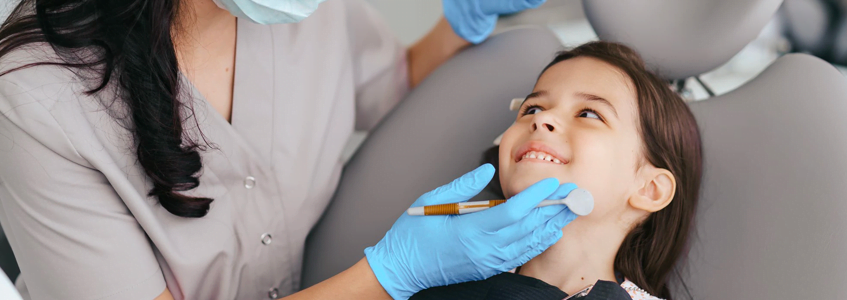© Copyright 2025. All rights reserved.
Designed by Lizart Digital
Updated Date : now
For Your Healthy Smile

Bad experiences in childhood affect the whole life of the individual. Fear of the dentist, which develops as one of the bad experiences, is also a common condition that develops in childhood. In order to avoid this situation, it is the best approach to support children by a pedodontist who is an expert in dental problems. These dentists, who provide special dental care and treatment services for children, are especially professionals in healthy communication with this age group. While serving in harmony with the mental and physical development of a child, it solves dental problems in the early period.
Pediatric dentistry, pedodontics, is also referred to as ‘pediatric dentistry’. This concept, which has passed into our language from a Latin word, means child teeth. It carries out treatments for the protection of healthy people between the ages of 0-13. It also treats dental problems caused by factors such as hereditary, trauma and caries. Starting from infancy, it follows the development of the mouth and teeth and the maxillofacial region. In possible problems, treatment begins in the early period.
These dentists receive special training to establish healthy communication with children. In this way, it applies preventive and curative dental treatments without fear of the dentist. Their first priority is to take measures to prevent dental problems in children. In this way, they prepare children for a rot-free future. They treat the dental and oral problems detected during routine controls in the early stages and solve the problem before it grows. It also enables children to be conscious of proper dental care.
Pedodontics also offers treatments for quitting bad oral habits such as nail biting and thumb sucking that develop during infancy and childhood. In addition, it provides solutions to dental problems that develop after dental traumas in childhood, which is the most active period. With the training he has received, if there is tooth loss due to trauma, he shows the most appropriate way. In summary, this branch of science gives a professional dentistry about dental and oral health in these ages with a multidisciplinary approach.
Pediatric dentists help this age group to enjoy oral and dental care thanks to the strong communication between them and children. It enables children to get used to the dentist by closely following their physical and mental development. Since they are knowledgeable, they can easily detect tooth eruption problems. In addition, they can see orthodontic disorders at an early stage and refer to an orthodontist. In addition, if the child has habits such as nail biting and thumb sucking, he applies treatment to quit.
Pedodontics prepares the ground for healthy permanent teeth by making protective applications on milk and permanent teeth from the eruption period in infancy. When fixed teeth erupt, it provides early intervention in cases of disorder. Thus, it ensures the necessary protection of the teeth that will be carried in the mouth of the children who will be the adults of the future. It also provides educational support about quality care products and correct techniques that children should use in dental cleaning and care.
Pediatric dentists also treat teeth damaged by blows to the mouth area as a result of falling accidents, which are frequently experienced in childhood. It guides families on what to do in some accidents that cause the teeth to completely come out of the jawbone. In such a case, the best approach is; It is to wash under pressureless water without touching the root of the displaced tooth and to apply to pedodontics as soon as possible.
Dentists who have graduated from 5-year dental faculties become a pediatric dentist if they receive specialization or doctorate training within the scope of the department of pedodontics. These pediatric dentists, known as pedodontists, primarily aim to prevent dental problems in children. What exactly are the duties of these dentists?
Pedodontists, who treat children’s dental problems in a way that interests and loves them, are generally loved by children. In this way, children develop healthy oral and dental care habits.
The discipline of pedodontics, which produces effective solutions for the dental health of children aged 0-13, is a field that has developed considerably in the last ten years.
In the previous periods, milk teeth were not given much importance because they were not permanent. No treatment was applied for the caries and disorders that occurred. Today, with the understanding of the importance of the existence of pediatric dentists, children who start to erupt are routinely taken to pediatric dentists.
While many dentists make many different applications according to their needs, the most common of these applications are:
In the childhood and youth period, the ways of coping with problems and the reactions of each individual are different. A child who has never been to the dentist usually gets his fears from his parents. Apart from this, he learns by witnessing friends, other family members and relatives sharing their experiences with each other. This may cause a prejudice such as fear of the dentist. However, in cases of dental problems experienced in children, the problem can be solved in the early period by applying to the pediatric dentist in the early period, with the above-mentioned methods.
In children, milk teeth that start to erupt at 6 months can grow up to 5 years old. In some cases, the first tooth may erupt even earlier than the 6th month. When babies reach the age of 1, it is recommended to take them to the first dentist control. In addition, according to the American Association of Pediatric Dentists and the WHO World Health Organization, it is ideal to have this first dental check-up between 6 months and 1 year old.
The first acquaintance of the baby with pedodontics starts with the first examination. In this process, the specialist gives information to the family about the oral and dental health of their babies. With the information it gives about normal and non-normal processes, it enables them to notice possible dental problems in this period at an early stage. It raises awareness of families about oral hygiene that should be done to protect the baby’s teeth. It also checks the erupting teeth of the baby and evaluates whether it is progressing normally or not.
In some children, milk teeth begin to decay very early. This may be due to hereditary, dietary habits, or inadequate dental care. In addition, in some cases, cavities may develop with habits such as thumb sucking, bottle chewing, pacifier and nail biting that negatively affect teeth. Pedodontics starts the necessary treatments by helping the family and the child in all these matters.
Pediatric dentistry Pediatric dentistry Pediatric dentistry Pediatric dentistry Pediatric dentistry
Zenit Dent Zenit Dent Zenit Dent Zenit Dent Zenit Dent Zenit Dent Zenit Dent Zenit Dent Zenit Dent Zenit Dent Zenit Dent Zenit Dent Zenit Dent Zenit Dent Zenit Dent
Hacı Halil Mah. 1207 Sok. No:2/B Gebze – Kocaeli

+90 (262) 606 00 44
+90 (262) 606 00 44
Contact us to get information about our applications and to create an appointment.
© Copyright 2025. All rights reserved.
Designed by Lizart Digital
Updated Date : now